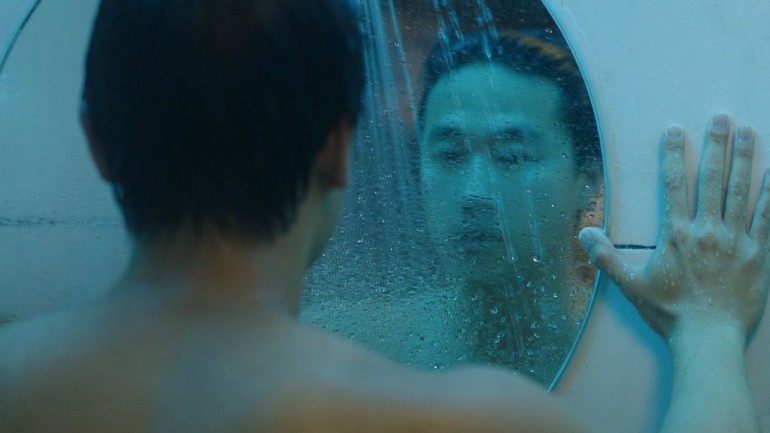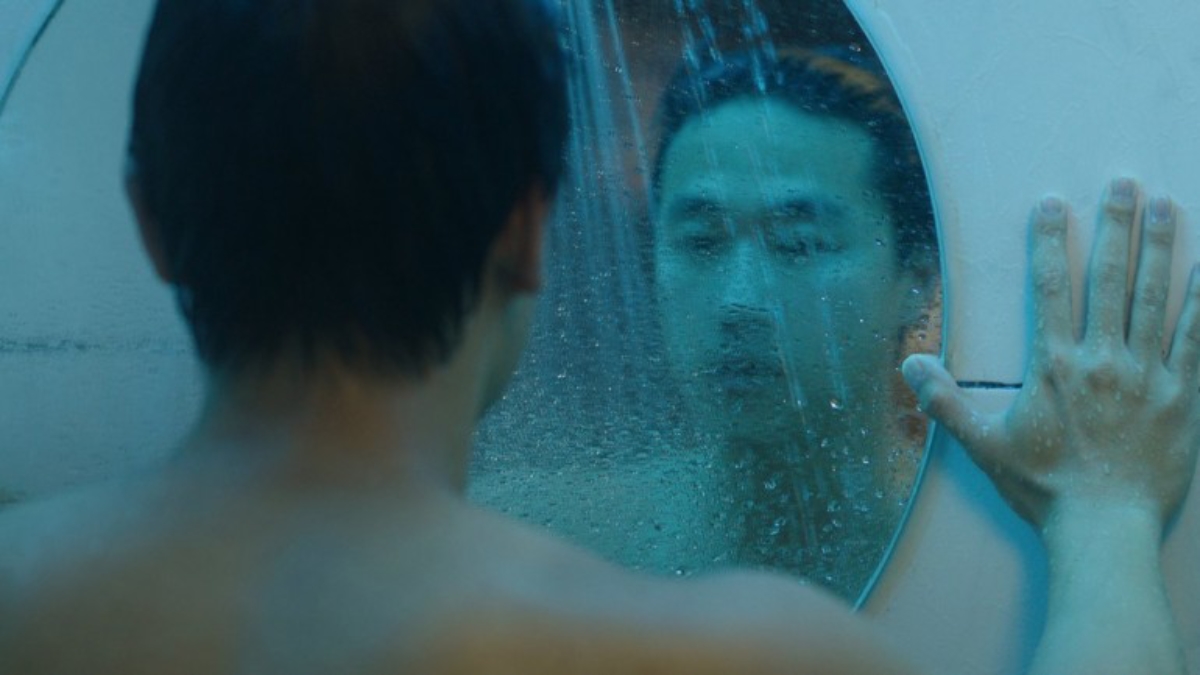
SPA NIGHT will be opening AAIFF ’16 on Thursday, July 21 at Asia Society at 7 p.m. Buy tickets for the gala, showing + panel featuring Andrew Ahn and Joe Seo here.
By Tracy Chung
On Mother’s Day this year, my sister invited my mother and me to her place for a quiet ladies’ weekend. I’d been having a tough time in my personal life, and Sis was going to be away for a month or so, and Mom was just worried. What better way to spend Mother’s Day than in family therapy? The evening’s featured entertainment was a private screening of SPA NIGHT by Andrew Ahn. Sis, our septuagenarian mom, and I sat side-by-side on a lumpy sofa craning to watch the film, which buffered at times due to lack of bandwidth, on said sister’s 14-inch screen Macbook–hardly VIP advance screening conditions. At least there was plenty of bourbon in the house.
[youtube]https://www.youtube.com/watch?v=TLGcaThfRzI[/youtube]
The film opens with the main character, David (Joe Seo) and his parents at a Korean spa in Los Angeles. If you don’t know what a Korean spa is, well, I’d say you’re not missing much. It’s essentially a communal bathhouse. Gross. My sister once said, “If you can get used to the nakedness, it’s great!” It’s not so much the nakedness that I couldn’t deal with. It was just the sheer premise–communal bathing. I can’t stand doing too many things communally. I avoid all-you-can-eat buffet restaurants. I never want to take a cruise. While I was living in Seoul, I went to a spa only once, because my mom and sister were visiting, and they wanted to go. Mom made me get a massage, in addition to trying the communal bath. The masseuse straddled me wearing nothing but panties and a headband (samurai style). She was stocky, and had exceptionally soft man hands.
Despite my distaste for Korean spas, I do have an affinity for Asian American creative work, so I was up for watching SPA NIGHT, the opening film of the 2016 Asian American International Film Festival. It certainly seemed like something I would much rather do than go to a Korean spa in Flushing. At least that’s what J.C. Woo thought. Probably some kind of social experiment, having us watch it during a family therapy weekend. Mom was surprisingly attentive during the film. She definitely had instant recognition with the family dynamic in the film, and most of the dialogue throughout is in her native tongue of Korean. The film certainly kept me engaged. I was also surprisingly not as uncomfortable as I thought I would be watching the sex scenes with my mom.
When J.C. Woo asked me what my reactions were, and what my peers’ reactions would be, I was torn. On one hand, I enjoyed the film, for the same reasons that I tend to be fond of other well-crafted, Asian American indie films: a lot of stillness, interesting cinematography (on the streets of LA Koreatown), good dramatic acting, familial conflict, and deep suffering. I am reminded of high quality Asian American independent films like Charlotte Sometimes and Saving Face from the 90s, the period of my life when I sought out as much Asian American artistic, social, and political engagement as I could find.
I like how SPA NIGHT portrays the dynamic of a struggling, Korean immigrant family with some compassion. There is little doubt in my mind that the experiences of both being an immigrant and being the child of immigrants are wrought with emotional trauma. Our family was pretty much devoid of expressions of love and compassion, so even the simplest forms are notable. For instance, when David’s father comes home drunk as a skunk, and his mother really lays into her husband, he…wait for it…apologizes. And he says it…with feeling. Then his father leaves, and his mother instructs David to follow him to make sure he doesn’t drive. Regret, disappointment, forgiveness, and of course, safety first.
On the other hand, my friends and colleagues from graduate school would appreciate SPA NIGHT even more than me, because they might not be as down on Korean spas. But back in the 90s, when I was among Asian American professionals in the DC area, most people I talked to did not embrace a then rising Korean American author, Chang-Rae Lee. Most of my “peers” (I was a grad student, and most of this crowd were consultants or lawyers) said they didn’t love Lee’s breakout novel Native Speaker because they “couldn’t relate to it.” They tended to prefer Don Lee’s short story collection Yellow, or better yet, Amy Tan’s The Joy Luck Club. My peers didn’t seem to appreciate that the novel was doing something distinctly different in the realm of Asian American fiction, carving out a new creative and discursive space.
SPA NIGHT is carving out new space, in terms of visualizing a difficult human landscape. For instance, I don’t think I’ve seen any other film that narrates a young male’s closet homosexuality so starkly through the lens of male bodies. (But admittedly, I have seen very little in the past decade.) Again, a lot of unspokenness. The arc of male bodies begins with David’s selfies of his own body (abs and cock) and progresses to his being surrounded by the “nakedness” of the spagoers. His voyeuristic position elevates (literally, he goes upstairs) to seeing the male bodies desiring and pleasuring each other through the secret sexual encounters in the sauna. Ultimately, David participates with his own body through his sexual encounter with another man in the steam room. David initiates by asking the man if he is Korean, to which the man responds, “Yes,” and David says, “Me, too.” As if that is code for “We are the same, and we want each other.”
At the same time, I realized that SPA NIGHT is doing something familiar. The film portrays David as a deferent, filial young Korean American, tortured by an identity that has no place in his family or community. Isn’t this the story of Mu-Lan? David performs the classic act of the good son. He behaves subserviently in adoration of his parents. He cannot tell them the truth about working at the spa, much less about his sexual identity. He agrees to go to the costly SAT prep classes even though he is not interested in going to college. Still performing what is expected of him, David goes on a Korean-mothers-arranged visit to USC, where his old church friend Eddie is his host. David feels like an imposition upon arrival, which unfortunately foreshadows an unpleasant departure.
Still the depth of David’s desire and pain is unmistakable, and Ahn’s ability to convey such emotional trauma with economy–little narration, few characters, localized setting–perhaps made it easy for us in the family viewing to take it in. We were all drawn to David and his family. Though they were down and out financially, they were mostly good and kind to each other. We all felt deep sorrow for David and his conflict with himself. At the end of David’s first sexual encounter in the steam room, the spa manager opens the door, and the other man runs out. David turns his head to the side in shame. Then, he goes into the bathhouse and proceeds to scrub himself to the point of bleeding. His tears, his anguish, his self-hate, and self-inflicted suffering were intense. I’m pretty sure we all had our faces scrunched up watching that scene.
I’m not saying that I know anything about being in the closet. But I do know a lot about trying to be what other people expect me to be. I think we all know how the shackles of family can bind. Sometimes we have to break away. Yet we keep coming back, even if it’s not the same kind of family, and maybe it is less constricting. Sometimes we just want to be around other people who know how screwed up we are. At the end of the film, David stands up in church with his parents at his side. He remains standing, after the other congregants have sat down. Perhaps he is trying to pray the gay away. Or, perhaps he is trying to stand alone, stand out from the flock. Nonetheless, I was left hopeful but sure that David’s process of realizing his sexual identity is far from over.

